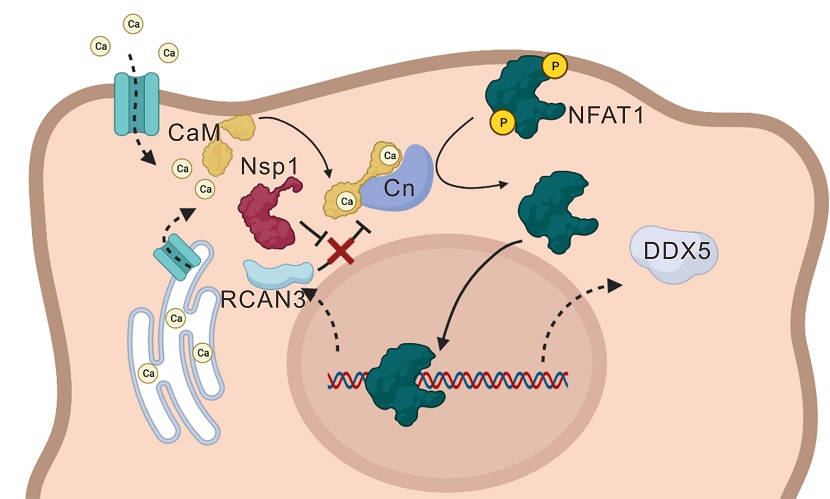Nsp1 Orchestrates SARS-CoV-2 Replication Via Manipulation Of Calcineurin-NFAT Signaling
Nikhil Prasad Fact checked by:Thailand Medical News Team Mar 03, 2024 1 year, 11 months, 1 week, 6 days, 10 hours, 31 minutes ago
COVID-19 News: The COVID-19 pandemic, caused by the severe acute respiratory syndrome coronavirus 2 (SARS-CoV-2), has brought about an unprecedented global health crisis, challenging healthcare systems and economies worldwide. Despite the development and deployment of vaccines, the virus continues to evolve, posing ongoing threats to public health. In this dynamic landscape, understanding the molecular mechanisms underlying SARS-CoV-2 replication is crucial for devising effective antiviral strategies. This
COVID-19 News report covers a study by researchers from the University of Hong Kong - China that finds that the NSP1 protein facilitates SARS-CoV-2 replication through calcineurin-NFAT signaling.
 SARS-CoV-2 replication through calcineurin-NFAT signaling
A working model. Influx of Ca2+ through ion channel results in the activation of calmodulin (CaM), which interacts with and stimulates calcineurin (Cn) to dephosphorylate and activate NFAT1, leading to its nuclear translocation and activation of target genes including DDX5. RCAN3 is a negative regulator of NFAT that forms a complex with Cn. SARS-CoV-2 Nsp1 interacts with Cn to prevent its interaction with RCAN3, thereby depressing NFAT1.
Nsp1: A Key Virulence Factor
SARS-CoV-2 replication through calcineurin-NFAT signaling
A working model. Influx of Ca2+ through ion channel results in the activation of calmodulin (CaM), which interacts with and stimulates calcineurin (Cn) to dephosphorylate and activate NFAT1, leading to its nuclear translocation and activation of target genes including DDX5. RCAN3 is a negative regulator of NFAT that forms a complex with Cn. SARS-CoV-2 Nsp1 interacts with Cn to prevent its interaction with RCAN3, thereby depressing NFAT1.
Nsp1: A Key Virulence Factor
Non-structural protein 1 (Nsp1) is a pivotal virulence factor encoded by SARS-CoV-2, crucially involved in the early stages of viral replication. Nsp1 exerts multifaceted functions, including the suppression of host mRNA translation and inhibition of the type I interferon response, favoring viral replication. Moreover, Nsp1 enhances viral mRNA translation and interacts with cellular ribosomal proteins to modulate host cellular machinery in support of viral replication. Notably, Nsp1 knockout studies have underscored its indispensability for SARS-CoV-2 viability, highlighting its significance as a therapeutic target.
NFAT Signaling Pathway: A Nexus of Immune Regulation
The nuclear factor of activated T cells (NFAT) signaling pathway plays a crucial role in immune regulation and cellular homeostasis. NFAT proteins, governed by the phosphatase calcineurin, regulate gene expression in response to various stimuli, including calcium signaling. Importantly, NFAT activation has been implicated in diverse cellular processes, including immunity, inflammation, and cell proliferation. The intricate regulation of NFAT activity involves feedback mechanisms mediated by regulatory proteins like regulator of calcineurin 3 (RCAN3), ensuring precise control over immune responses.
Interplay between Nsp1 and NFAT Signaling
Recent studies have unveiled a novel interplay between Nsp1 and the NFAT signaling pathway, shedding light on the molecular mechanisms underlying SARS-CoV-2 replication
.
Nsp1 was found to usurp calcineurin-NFAT signaling, driving the expression
of cellular factors essential for viral replication. Mechanistically, Nsp1 interacts with calcineurin A (CnA), disrupting the interaction between CnA and RCAN3, thereby promoting NFAT activation. This leads to the upregulation of cellular genes, including DEAD-box helicase 5 (DDX5), a known facilitator of SARS-CoV-2 replication.
Experimental Validation and Functional Insights
Experimental validation using Nsp1-deficient SARS-CoV-2 mutants corroborated the role of Nsp1 in NFAT activation and viral replication. Notably, enforced expression of Nsp1 and NFAT1 significantly enhanced viral replication, while the knockdown of DDX5 abrogated this effect, underscoring the importance of NFAT-mediated upregulation of DDX5 in SARS-CoV-2 replication. Furthermore, mechanistic studies revealed that Nsp1 induces NFAT dephosphorylation, primarily through its N-terminal domain, emphasizing the specificity of Nsp1-mediated modulation of NFAT activity.
Therapeutic Implications and Antiviral Strategies
The elucidation of Nsp1-mediated NFAT activation provides valuable insights for the development of antiviral strategies against SARS-CoV-2. Calcineurin inhibitors, such as cyclosporine A (CsA) and the CnA-NFAT interaction blocker VIVIT, exhibited potent antiviral activity by suppressing NFAT activation. Moreover, the synergistic effect of combining calcineurin inhibitors with the SARS-CoV-2 main protease inhibitor nirmatrelvir holds promise for enhanced viral inhibition and clearance. These findings highlight the therapeutic potential of targeting the Nsp1-NFAT axis to combat SARS-CoV-2 infection.
Clinical Implications and Future Directions
Understanding the intricate interplay between viral proteins and host signaling pathways is essential for unraveling the complexities of viral pathogenesis and identifying novel therapeutic targets. Further investigations into the role of Nsp1 in modulating NFAT signaling in diverse cell types and disease contexts are warranted. Additionally, clinical trials evaluating the efficacy and safety of calcineurin inhibitors in the treatment of COVID-19, alone or in combination with other antiviral agents, are imperative for translating preclinical findings into clinical practice.
Conclusion
In conclusion, the convergence of Nsp1 and NFAT signaling represents a critical nexus in the molecular landscape of SARS-CoV-2 replication. By elucidating the mechanisms underlying Nsp1-mediated NFAT activation, this study not only advances our understanding of viral pathogenesis but also unveils new avenues for therapeutic intervention. Harnessing the therapeutic potential of targeting the Nsp1-NFAT axis holds promise for combating COVID-19 and mitigating the ongoing global health crisis.
The study findings were published in the peer reviewed journal: mBio.
https://journals.asm.org/doi/10.1128/mbio.00392-24
For the latest
COVID-19 News, keep on logging to Thailand Medical News.
Read Also:
https://www.thailandmedical.news/news/sars-cov-2-research-vietnamese-researchers-discover-that-sars-cov-2-nsp1-proteins-bind-to-ribosome-40s-subunits,-inhibiting-mrna-translation
https://www.thailandmedical.news/news/covid-19-news-stanford-study-discovers-sars-cov-2-evades-immune-system-s-nk-cells-via-nsp1-induced-downregulation-of-receptor-nkg2d-ligands
https://www.thailandmedical.news/news/breaking-german-study-reveals-that-nsp1-protein-from-sars-cov-2-suppresses-human-host-genes,-long-term-health-implications-expected
https://www.thailandmedical.news/news/coronavirus-latest-yale-study-shows-that-nonstructural-protein-1-of-sars-cov-2-hijacks-host-protein-synthesis-in-ribosomes-to-make-viral-proteins
https://www.thailandmedical.news/news/breaking-covid-19-research-german-study-reveals-that-spike-protein-nsp1-of-sars-cov-2-responsible-for-shutting-down-host-protein-production
https://www.thailandmedical.news/news/covid-19-genomics-swiss-researchers-discover-how-sars-cov-2-nsp1-protein-inhibits-host-translation--findings-has-implications-for-vaccines-and-drugs
